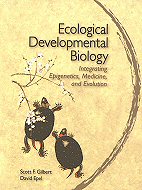Ecological Developmental Biology:
Interacting Epigenetics, Medicine, and Evolution
|
|
Scott F. Gilbert, David Epel
|

|

Ecological developmental biology concerns the interactions between developing organisms and their environmental contexts. It studies development in the "real world" of predators, competitors, symbionts, toxic compounds, temperature changes, and nutritional differences. The study of epigenetics - gene expression changes that are not caused by alterations of a gene's DNA sequence - has recently provided startling insights into the ways that these environmental factors can alter the phenotype of the organism. Epigenetic research has shown that such environmental influences are not only active but are also necessary for the normal development of most animal species. Ecological developmental biology also studies the pathological activities of environmental teratogens, endocrine disruptors, and certain details. These findings offer new and unexpected insights for our understanding and treatment of diseases such as cancer, obesity, and diabetes. In certain instances, such environmentally induced epigenetic states can be transmitted between generations; and this book's final section attempts to describe what evolutionary theory might look like when it includes developmental plasticity, the epigenetic origin of novel phenotypes, the transmission of certain epigenetic traits between generations, and the selection of relationships between hosts and a consortium of symbionts.
|
|
